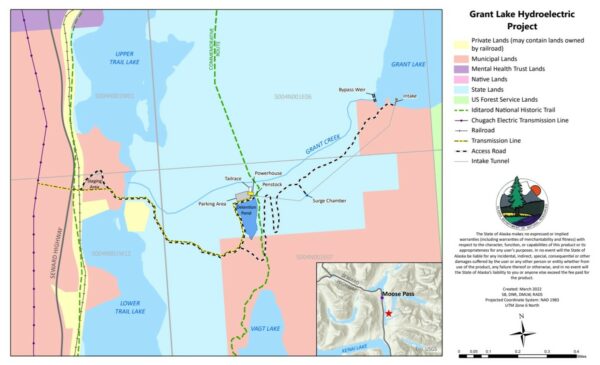
A long-time plan to build an hydroelectric project in Moose Pass on the eastern Kenai Peninsula is one step closer to coming to fruition. That’s after the Kenai Peninsula Borough Assembly greenlit a reclassification of land in the area, paving the way for an easement and access road to the proposed plant.
Homer Electric Association has been working on the project for over a decade and says the road is the best and only feasible way to connect the proposed plant with the electrical grid.
But the route is facing pushback from residents in Moose Pass, like Bruce Jaffa, who said they support the project but would like the utility to find another route.
“It’s kind of just a blemish that the community will have to live with,” Jaffa said.
The Grant Lake project has been a long time coming.
Homer Electric Association has been studying the feasibility of a project there since 2008. Just a few years ago, it obtained licenses to start work on the plan, which would generate about 18,600-megawatt hours of energy each year for the co-op — about 4% of its overall load — by diverting water from Grant Lake.
One component of the project is an easement for the access road to the plant, for project construction and routine maintenance, as well as the transmission line that will transmit any electricity generated from the project.
Homer Electric considered building that easement in another spot, next to a proposed new section of the Iditarod Trail. But it said the Forest Service told them they couldn’t build so close to the proposed trail.
The other option was to build a private easement and single-lane bridge over the Trail Creek Narrows — the small channel that connects the upper and lower parts of the nearby Trail Lake. And at a Kenai Peninsula Borough Assembly meeting earlier this month, Homer Electric asked the assembly for permission to reclassify about 9 acres of borough land from recreational to utility-transportation use so they could do so.
Mike Salzetti manages fuel supply and renewable energy development for Homer Electric.
He said the Grant Lake plan is important so that the utility can meet its goal of sourcing half of its power from renewables by 2025. Without the green light from the Forest Service on the other pathway, he said this road is the only way to build out Grant Lake.
“We have no option on that,” he said. “We had originally had a road scheduled in that area, but it just physically could not be built.”
Cindy Ecklund represents the eastern peninsula, including Moose Pass, on the assembly. She said she’s heard concerns from locals about the environmental impacts of that route, including the disruption of a local eagle nest.
She said she also worries the easement starts at a dangerous stretch of the Seward Highway and that it would impact local hikers and kayakers.
“I mean, hopefully it can be built and it can be built without impacting the safety of the community, the health of the animals and the environment,” she said.
Ecklund’s not alone in her concerns. The Moose Pass Advisory Planning Commission rejected the reclassification at a May meeting.
Jaffa is a member of that commission. He said the area where the easement will be built, over the narrows, is part of the scenic and recreational areas protected in the 1993 Moose Pass Comprehensive Plan.
“Just the pristine nature of it will be gone,” he said. “And it could’ve been avoided.”
Homer Electric is applying for the road to be a private easement, with the suggestion that recreators take different trails to get to the lake. But the state’s regional land office suggested making it a public access easement. Those details are all to be worked out later on.
Despite the recommendation from the Moose Pass commission, the borough’s planning commission and assembly both voted to approve the reclassifications.
Assembly member Brent Hibbert said it was important to stop kicking the project down the road — especially in the face of Homer Electric’s impending renewables goals.
“We’re never going to get anything done if we don’t stand up and do it,” he said at the assembly meeting.
Ecklund was the only assembly member to vote no.
She said she’s not against the project. But she said she wants to make sure local voices are heard.
“I really hope that our assembly and planning commission are listening to the people that we represent, and not just letting the government wheels run without hearing what our borough residents are saying to us,” Ecklund said.
There are more permits and permissions Homer Electric needs to take before it can move forward with the easement, including a Fish Habitat Permit. The utility hopes to start construction on the project in 2023.
You can find updates on the project here.
[Sign up for Alaska Public Media’s daily newsletter to get our top stories delivered to your inbox.]




